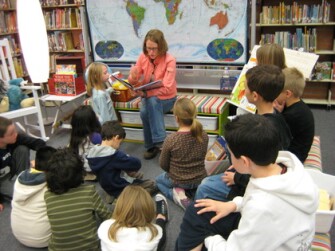This week a new resource shares strategies and tools to engage students and educators with books from around the world. Kathy Short, director of Worlds of Words and Jennifer Manise, Executive Director of Longview Foundation, share how global stories are effective classroom tools.
While there is an increasing need for global education, the actual implementation of a curriculum that builds international understanding remains an elusive or unevenly applied goal in many schools. Tools to help integrate global learning in classrooms are growing in number, but educators need assistance in finding and implementing quality standards-based approaches.

One of the most effective global tools are stories, a natural form of communication told through words, song, dance, movies, and even mathematical formulas. Telling stories is more than something we do—it is how we think. A story allows us to understand and organize our experiences. We construct narratives to interpret what is occurring around us and we also use narrative to better understand who we are.
Stories also have the power to naturally engage us—which is why global stories are so very important for today’s students. We become more alert (and more likely to remember) when a speaker tells us a story. We connect with stories much more than a list of facts. Stories integrate our lives into the fabric of society and cement our learning for years to come.
Discussing stories, unpacking dialogue, and applying new understandings to classroom units are all the subject of a new report released this week by Worlds of Words and the Longview Foundation. During the past three years, Worlds of Words, in collaboration with the Longview Foundation for Education in World Affairs and International Understanding, supported the development of 25 teacher study groups in elementary, middle, and high schools across 19 states. The goal of these global literacy communities was to integrate global literature for children and adolescents into classrooms in order to build international understanding. Educators worked with students in their classrooms, shared experiences with colleagues in other groups through an online forum, and published vignettes of their work in an online journal (WOW Stories).
The study groups were educators who met to explore global literature and international understanding through dialogue with each other. The groups took many different forms including school/university partnerships, school-based groups of teachers, and community-based groups cutting across different contexts. Most met twice a month outside of school hours and engaged in a range of activities:
- Sharing and planning classroom experiences
- Examining student work to identify student needs in order to plan instruction
- Reading and discussing children’s books
- Locating and browsing resources and books
- Reading professional articles and books
Teachers in the study groups integrated global literature into their classrooms using instructional approaches that ranged from adding global books into an existing curriculum to creating new units in literacy or social studies. Groups found that engagement with global literature was an effective way to incorporate the ELA Common Core State Standards around the integration of knowledge and ideas and the reading and comprehending of complex literary and informational texts as well as the standards on comprehension and collaboration. They found that interactions with global literature particularly utilized complex texts and higher-order thinking.

Research on innovation indicates that when educators work and think together around a focus such as global education, they are more engaged and innovative. Their group’s dialogue and shared explorations into global literature develops a network of supports and challenges, and ultimately initiates and sustains positive changes in each educator’s practice.
In addition to promoting higher order thinking, global literature expands our worldview so that stories become a window for readers to see and experience cultures outside their own personal contexts. As we read stories set in different cultural contexts, our understanding of diverse perspectives and ways of thinking are expanded. In the process, we come to realize that our perspectives grow out of our own experiences and identities. Global literature also encourages curiosity about the world.
More information on the ways in which the global literacy communities have worked together in study groups to integrate global literature can be found in this free guide, Exploring International and Intercultural Understanding through Global Literature. Classroom examples are linked to vignettes in which teachers provide rich descriptions of classroom experiences and share student work along with book lists.
Connect with Longview Foundation and Asia Society on Twitter.
Kathy Short is also Professor, Language, Reading & Culture, University of Arizona and President, National Council of Teachers of English.
Images courtesy Kathy Short.




